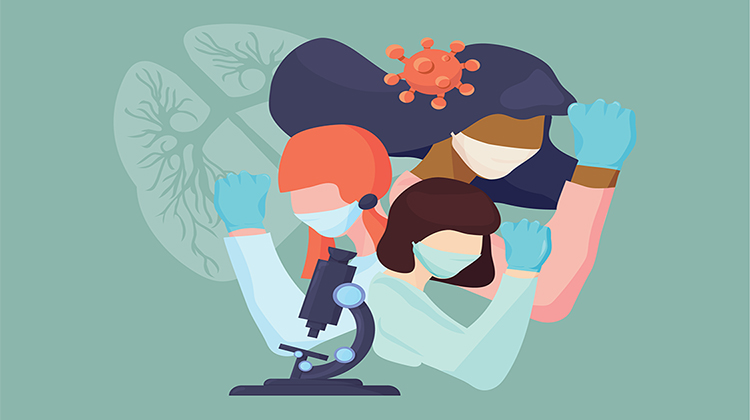Women in STEM with Delphine Guyon-Gellin
Posted: 26 March 2024 | Delphine Guyon-Gellin (Osivax) | No comments yet
Join us for our Women in STEM series with Delphine Guyon-Gellin, Chief Business Development Officer at Osivax. She joined the company in 2018 with 15 years of experience in vaccine business and strategy. Prior to her work at Osivax, Delphine worked as a strategic consultant for leading pharmaceutical companies, helping them solve their key challenges, along with an in-depth expertise in strategy for vaccines. She holds a Doctorate from the Ecole Vétérinaire de Maisons-Alfort and a Master’s degree in Marketing from the HEC Paris.


Can you tell us about your journey in the field of STEM and the challenges you encountered along the way?
DGG: I started my journey in STEM as a strategic consultant with various global pharmaceutical groups, working to solve specific strategic questions and being fully focused on one critical topic for a short time. After 10 years of supporting other teams, I wanted to become a full-time member and focus on using my analytic skills on a specific story that I believed in. In biotech, I discovered a new way of working on multiple priorities and critical topics at the same time. It is my job to identify which strategic pathway could make the greatest difference and its impact for our team and within the scientific community.
What inspired you to pursue a career in STEM, and how did you overcome any obstacles or biases you may have faced?
DGG: I have a deep passion for biology and a keen interest in understanding the many complexities of the human body and its functions. In my role as Chief Business Development Officer at Osivax, my main challenge is taking the deep scientific work of our research & development team and simplifying it for various audiences
Could you share an example of a specific project or research that you have worked on and the impact it has had in your field?
DGG: At Osivax, we’re working on a new class of vaccines that target invariant parts of mutating viruses; this approach is disruptive and very different from conventional vaccines. Due to previous setbacks in the vaccinology space, it takes a lot of effort to convince the scientific community of the potential of our approach. Last summer, we published a first signal of efficacy in humans in the LANCET Infectious Diseases for our lead broad-spectrum influenza candidate, OVX836. I believe that the work we have committed to can change the Industry’s perspective on our approach and its ability to generate a universal influenza vaccine.
How has your research in STEM contributed to advancements or improvements in your field, and what potential future applications or implications do you foresee based on your work?
DGG: We have generated preclinical and clinical data demonstrating the potential of our vaccines against invariant parts of viruses and its ability to provide a very broad spectrum of protection against all current and future strains of mutating viruses such as Influenza or coronavirus. This could revolutionize the way we prevent mutating viruses and lead to vaccines with a much higher level of efficacy and a much broader spectrum of protection.
As a woman in STEM, what unique perspectives or strengths do you believe you bring to your work?
DGG: Resilience: In science, we can’t predict and control everything. Sometimes science “speaks” and sometimes it doesn’t. I always try to remain focused and unbiased in my analysis, but I also find it important to be resilient and not stop at the first read-out or conclusion. You must keep digging, thoroughly analyse your results, and put them into perspective in order to draw the right conclusions.
What advice would you give to young women who are considering a career in STEM but may be hesitant due to societal stereotypes or perceived challenges?
DGG: I would recommend that young women take a chance and find what they are passionate about. Our field is fascinating, and women have and continue to contribute to the discovery of so many life-changing advances in our industry. Working in STEM is a lifelong learning experience that always challenges you to unveil incredible biological mechanisms that enable patients to live longer and healthier lives.
How do you see the representation of women in STEM changing over the years, and what further progress do you believe is needed?
DGG: I see more women choosing a career path in STEM and in some fields, at a higher rate than young men. I believe we have to continue to inspire and empower women and young girls to pursue a career in STEM.
In your opinion, what can organizations and institutions do to create a more inclusive and supportive environment for women pursuing STEM careers?
DGG: Start instilling in young girls at a very early age that they can do and be whatever they want. Teach them that they can make a difference while nurturing their skills in the sciences and mathematics. I believe it would be so impactful if schools invited women who have created a successful career in STEM, to come and share their experiences and mentor young female scientists to understand the challenges and best practices, both professionally and personally.
Looking ahead, what exciting developments or advancements do you foresee in your field of STEM, and how do you envision your own research contributing to those future innovations?
DGG: Vaccines are experiencing a revolution in the post-COVID era with the emergence of mRNA technology. This shift has brought a lot of investment back into the field and has created an opportunity for other approaches. It is my hope that this new wave permits the rise of ground-breaking new technologies and mechanisms of action that truly revolutionize the prevention of constantly mutating viruses, which remains a major public health challenge.
Moreover, all the advances made in better understanding the underlying immune response serve other indications in immuno-oncology and auto-immune diseases where better treatments are still needed.
About the author


Chief Business Development Officer at Osivax
She joined the company in 2018 with 15 years of experience in vaccine business and strategy. Prior to her work at Osivax, Delphine worked as a strategic consultant for leading pharmaceutical companies, helping them solve their key challenges, along with an in-depth expertise in strategy for vaccines. She holds a Doctorate from the Ecole Vétérinaire de Maisons-Alfort and a Master’s degree in Marketing from the HEC Paris.
Related organisations
Osivax
Related people
Delphine Guyon-Gellin (Osivax)



